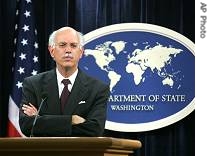2006年VOA标准英语-Counterterrorism versus Darfur?(在线收听)
By Peter Fedynsky
Washington, DC
21 November 2006
watch Counterterrorism v Darfur
President Bush's Special Envoy for Sudan has denied an allegation that the counterterrorism cooperation between Khartoum and Washington is impeding U.S. efforts to stop the genocide in Darfur.
In Sunday's Washington Post newspaper, the former director of African affairs in the Clinton administration's National Security Council, John Prendergast, claims that 400,000 people have died in Darfur. He alleges the United States has not pressured Khartoum to stop the genocide because the Bush administration does not want to jeopardize what Prendergast says is a deepening intelligence-sharing relationship with the Sudanese government. In the early 1990s, Al Qaida leader Osama bin Laden lived in Sudan, and that country has been a valuable source of information about terrorist activity since the attacks on the United States on September 11, 2001.
 |
| Andrew Natsios |
"You know how many times the intelligence issue has come up? Once. In one sentence, 'you know if you do this, it would disrupt this.' The people in the room were ignored -- people who were upset about that -- we ran over them and we did what we needed to do."
Natsios says U.S. policy in Darfur is driven by human rights, humanitarian concerns and development.
The terrorism allegation came up at another Brookings seminar on Darfur in April. At the time, Brookings' vice president, former Ambassador Carlos Pascual, denied any concessions to terrorism at the expense of the people of Darfur. Like Prendergast, Pascual served on the National Security Council during the Clinton administration.
"I personally never found a situation where there was a trade off between being tough on the government of Sudan, because of the war on terror versus addressing the needs of the people of Darfur. What I did find was a constant issue that would come up is a recognition that in order to address the situation in Darfur and also sustain the comprehensive peace agreement that there needed to be the engagement and the involvement of the government of Sudan."
The United States supports establishment of a so-called "hybrid" force for Darfur that would include United Nations and African Union troops. However, Sudanese officials have been giving conflicting signals about Khartoum's support for the joint force.
Three years of fighting in Darfur have killed an estimated 200,000 people and displaced millions.